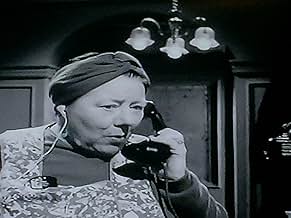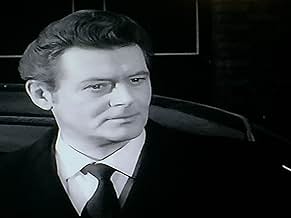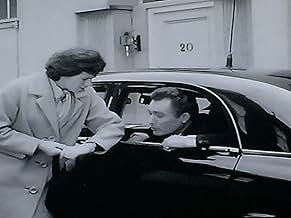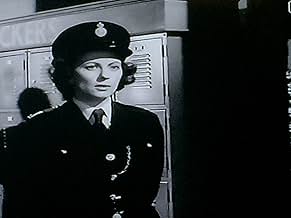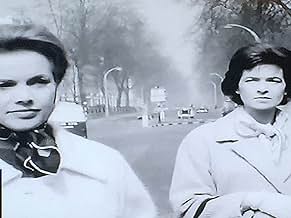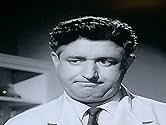Scotland Yard investigate when a woman, apparently the estranged wife of a London painter, is murdered with a shotgun in rural Surrey at the same time as the artist's striking model with her... Read allScotland Yard investigate when a woman, apparently the estranged wife of a London painter, is murdered with a shotgun in rural Surrey at the same time as the artist's striking model with her long black hair disappears.Scotland Yard investigate when a woman, apparently the estranged wife of a London painter, is murdered with a shotgun in rural Surrey at the same time as the artist's striking model with her long black hair disappears.
Frank Pettitt
- Fred
- (as Frank Pettit)
Reginald Hearne
- Doctor
- (as Reggie Hearne)
Featured reviews
Serena is a fun and intriguing little British film that exceeded my rather low expectations. Patrick Holt and Honor Black are amongst this solid cast all of which provide capable performances throughout. The story is interesting and does offer us a surprising plot twist toward the end of the film that I did not seeing coming. The look and sound of the film a good and creates a distinct vibe and feel that is appreciated. The direction is brisk yet steady in propelling the action ever forward. At a running time of just 60 minutes, Serena manages to pack in quite a bit to make this film one worth watching.
SERENA is another erstwhile mystery yarn from low budget outfit Butcher's Films. The story is a simple one which follows the investigations of a detective investigating the shotgun murder of a man's wife. At first he has no leads, but problems with the identification of the woman's body and the search for a missing model soon puts him on an unexpected track as regards to the culprit...
SERENA is a cheapie mystery with a not-bad script and some efficient direction from Peter Maxwell, who also handled a couple of other low rent thrillers from the era like BLIND SPOT and IMPACT. At 60 minutes it doesn't really have the chance to drag and I'll admit that the twist is a clever one that ties the preceding plotting together nicely.
Cast-wise, we get a leading performance from the stolid Patrick Holt (WHEN DINOSAURS RULE THE EARTH) as the detective and a mannered turn from Emrys Jones as the bereaved husband. The most famous face here is none other than Honor Blackman's, who's playing the role of the wife. Blackman is as glamorous as ever and her assured acting helps to lift the film's spirits a little.
SERENA is a cheapie mystery with a not-bad script and some efficient direction from Peter Maxwell, who also handled a couple of other low rent thrillers from the era like BLIND SPOT and IMPACT. At 60 minutes it doesn't really have the chance to drag and I'll admit that the twist is a clever one that ties the preceding plotting together nicely.
Cast-wise, we get a leading performance from the stolid Patrick Holt (WHEN DINOSAURS RULE THE EARTH) as the detective and a mannered turn from Emrys Jones as the bereaved husband. The most famous face here is none other than Honor Blackman's, who's playing the role of the wife. Blackman is as glamorous as ever and her assured acting helps to lift the film's spirits a little.
"Serena" is one of those films that, after I've watched it, I reflect back on the plot, wonder how convincing it all was, and debate whether to watch the film again to check! Certainly I had to think back about some of the scenes, but my eventual judgement was that it was all reasonably coherent.
Unusually (as a fan of postwar B films shot in and around London), I failed to recognise many of the supporting cast, with the exception of Peter Glaze as the station clerk at Victoria. (He went on to co-host "Crackerjack", a popular TV programme of my childhood.)
Honor Blackman's star potential was very evident, and Patrick Holt made a reasonable police inspector. The acting of several others was poor - in particular I was surprised to see that John Horsley, as the family solicitor, was an established actor, so amateurish were his reactions when he was being questioned. The trailing of Ann Rogers after she'd left the church looked very clumsy.
I was a little surprised to see that the film lasted only an hour - it seemed longer. Overall, it was very acceptable.
Unusually (as a fan of postwar B films shot in and around London), I failed to recognise many of the supporting cast, with the exception of Peter Glaze as the station clerk at Victoria. (He went on to co-host "Crackerjack", a popular TV programme of my childhood.)
Honor Blackman's star potential was very evident, and Patrick Holt made a reasonable police inspector. The acting of several others was poor - in particular I was surprised to see that John Horsley, as the family solicitor, was an established actor, so amateurish were his reactions when he was being questioned. The trailing of Ann Rogers after she'd left the church looked very clumsy.
I was a little surprised to see that the film lasted only an hour - it seemed longer. Overall, it was very acceptable.
I am very respectful of the Butcher Studios. They put out many programmers of sufficient quality to make you forget the main feature. SERENA is no masterpiece, but it is very competently directed by Peter Maxwell, who extracts quality performances from the entire ensemble, the stunningly beautiful Honor Blackman above all.
Director Maxwell very cleverly opens the film with the murder of Mrs Rogers, doing it in such a way that it becomes clear that the spectator will only get the data that he, Maxwell, is willing to release. The murder shows neither the face of the deceased nor that of the killer, and the door into Mrs Rogers' apartment is opened by the murderer's hand. One important clue: the murderer goes right in, without using any key to get in and find its mark, suggesting someone familiar enough with the abode to know its layout.
Holt makes a very classy, clued up and insistent police inspector. He never says more than he needs, cleverly and tirelessly reading all the signs until he plays the decisive identifying card that beats the criminal(s).
Excellent cinematography by Steven Dade, crisp editing by Morrison, and pleasant music by Johnny Gregory only enhance the quality of Maxwell's direction and of the Hearne and Abraham screenplay.
Of course SERENA forces you to suspend your disbelief here and there, and you can spot holes in the plot, but it is intelligently done with a shoestring budget and within a highly economical 59 minutes.
You will not waste your time if you watch it.
Director Maxwell very cleverly opens the film with the murder of Mrs Rogers, doing it in such a way that it becomes clear that the spectator will only get the data that he, Maxwell, is willing to release. The murder shows neither the face of the deceased nor that of the killer, and the door into Mrs Rogers' apartment is opened by the murderer's hand. One important clue: the murderer goes right in, without using any key to get in and find its mark, suggesting someone familiar enough with the abode to know its layout.
Holt makes a very classy, clued up and insistent police inspector. He never says more than he needs, cleverly and tirelessly reading all the signs until he plays the decisive identifying card that beats the criminal(s).
Excellent cinematography by Steven Dade, crisp editing by Morrison, and pleasant music by Johnny Gregory only enhance the quality of Maxwell's direction and of the Hearne and Abraham screenplay.
Of course SERENA forces you to suspend your disbelief here and there, and you can spot holes in the plot, but it is intelligently done with a shoestring budget and within a highly economical 59 minutes.
You will not waste your time if you watch it.
The film opens with a woman being shot dead. The victim is assumed to be Ann Rogers, the owner of the cottage in which the body is found, and the prime suspect is her estranged husband, an artist named Howard Rogers. Although Howard claims to have an alibi, he also has an obvious motive to want his wife dead. He has been having an affair with his model, Serena Vaughan, but Ann, a devout Catholic, has refused to grant him the divorce he would need to marry Serena.
And then the situation is turned upside down by a series of coups de cinema. Taken to identify the body, Howard claims it is not that of his wife, and Ann suddenly turns up alive and well, saying that she wants a reconciliation with her husband. Howard produces a witness who can support his alibi, and Ann tells the police that the murdered woman was Claire Matthews, a friend who was staying with her and was presumably killed by mistake for Ann herself. Suspicion now shifts to Serena Vaughan, who is missing. There is, however, to be one more devastating plot twist.
"Serena" was originally made in black-and-white as a B-movie, which explains its brevity, little more than an hour in length. Yet it is an intriguing, well-plotted murder mystery which keeps the audience guessing about who we can trust and which information we can take at face value. Although it was made as long ago as 1962, it still turns up regularly on British television, a testament to its durability. 7/10
A goof. The police officer investigating the crime holds the rank of Detective Chief Inspector, but after he shows his identity badge to a potential witness, the man addresses him as "Superintendent".
And then the situation is turned upside down by a series of coups de cinema. Taken to identify the body, Howard claims it is not that of his wife, and Ann suddenly turns up alive and well, saying that she wants a reconciliation with her husband. Howard produces a witness who can support his alibi, and Ann tells the police that the murdered woman was Claire Matthews, a friend who was staying with her and was presumably killed by mistake for Ann herself. Suspicion now shifts to Serena Vaughan, who is missing. There is, however, to be one more devastating plot twist.
"Serena" was originally made in black-and-white as a B-movie, which explains its brevity, little more than an hour in length. Yet it is an intriguing, well-plotted murder mystery which keeps the audience guessing about who we can trust and which information we can take at face value. Although it was made as long ago as 1962, it still turns up regularly on British television, a testament to its durability. 7/10
A goof. The police officer investigating the crime holds the rank of Detective Chief Inspector, but after he shows his identity badge to a potential witness, the man addresses him as "Superintendent".
Did you know
- TriviaFinal film of Benedicta Leigh.
- GoofsInspector Gregory introduces himself to Howard Rogers as Detective Chief Inspector Gregory. However, later on in the film when he is interviewing the Railway station Luggage Clerk and shows his identification, the clerk responds with 'Superintendent'.
Details
- Release date
- Country of origin
- Language
- Filming locations
- Blacksmith's Lane, Laleham, Staines-upon-Thames, Surrey, England, UK(establishing shot showing street where victim is shot)
- Production company
- See more company credits at IMDbPro
- Runtime
- 1h(60 min)
- Color
- Aspect ratio
- 1.66 : 1
Contribute to this page
Suggest an edit or add missing content


